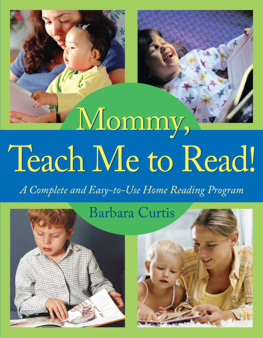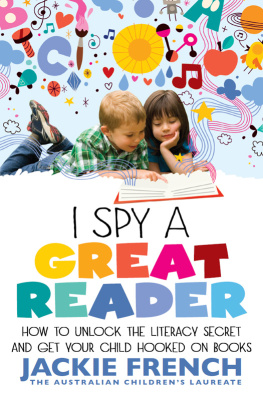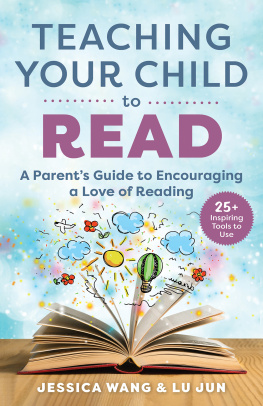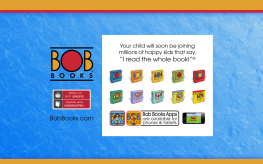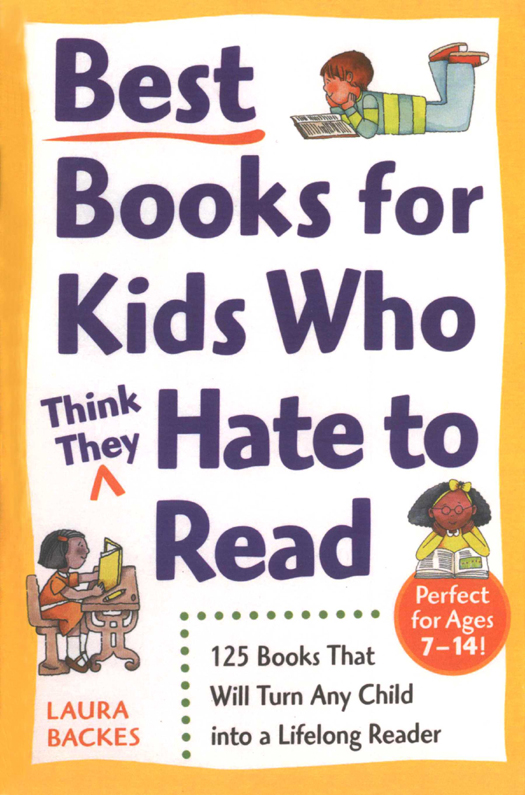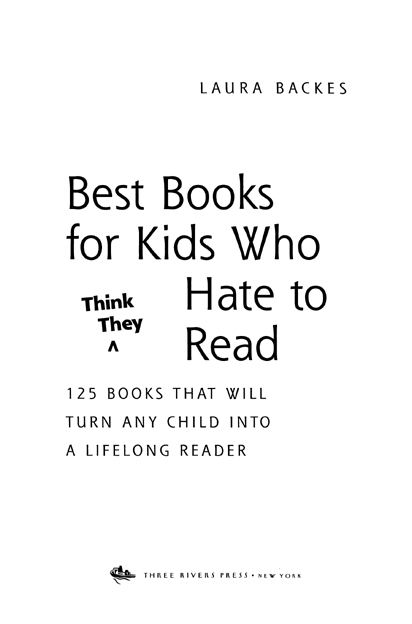Copyright 2001 by Random House, Inc.
All rights reserved.
Published in the United States by Three Rivers Press, an imprint of the Crown Publishing Group, a division of Random House, Inc.
Three Rivers Press and the Tugboat design are registered trademarks of Random House, Inc.
Originally published by Prima Publishing, Roseville, California, subsequently an imprint of the Crown Publishing Group, a division of Random House, Inc., New York, in 2001.
All products mentioned in this book are trademarks of their respective companies.
A complete list of credits and permissions begins on .
Library of Congress Cataloging-in-Publication Data
Backes, Laura.
Best books for kids who (think they) hate to read : 125 books that will turn any child into a lifelong reader / Laura Backes.
p. cm.
1. ChildrenBooks and readingUnited States. 2. ReadingParent participationUnited States. 3. ChildrenBooks and readingUnited StatesBibliography. 4. Childrens literatureBibliography. I. Title.
Z1037.A1 B17 2001
028.55dc21 2001024658
eISBN: 978-0-307-80917-9
First Three Rivers Press Edition
Visit us online at www.crownpublishing.com
v3.1
For Matthew, my all-time favorite reading buddy;
for Dad, who told me my first stories; and for Jon,
who helps me live happily ever after.
Contents
Introduction
I VE ALWAYS had a passion for childrens books, and since 1986 Ive been lucky enough to turn that passion into a means for earning a living. As an editor, writing instructor, and publisher of a newsletter for childrens book authors, Ive studied countless books for children and edited hundreds of manuscripts for aspiring writers. And I learned that, though styles and trends come and go, the elements that make a book appealing to a child are timeless and constant. I truly believed that childrens books were better written than books for adults and that the most magical, brilliant childrens books would always rise to the top where anyone who so desired could easily discover them.
And then I became a parent.
When I introduced my son to books, my first surprise was that he wasnt always taken with the books I love. My second surprise came when, at about a year of age, he had already developed preferences for certain styles of artwork and types of stories. I had to retrain myself to look at books through his eyes.
When I met other parents of young children, their first question was always Can you give me a list of books my child would like? Most of these parents understood the value of reading to their children and were eager to nurture a love of books, but they were lost when they entered a bookstore or library. They didnt know where to begin. As my son grew older, I met parents of young reluctant readers. Their question was more desperate: Can you recommend some books that will help my child want to read? The answer, I realized, was not as simple as handing over a list of titles.
If youre the parent of a child who doesnt like to read, youve probably felt the same frustration when faced with a wall of childrens books at the store or library. This book is created for you, to help you navigate through the ocean of available titles and choose whats right for your child. Ill show you how to recognize a good book for reluctant readers and how to match a book to your child. Because every child is different, there is no one-size-fits-all answer to which books are best, but this guide will help you develop a library your own child can love.
Those books that appeal to your child now can be stepping-stones to other works by the same author or to similar books.
The titles I recommend in the second part of this book are meant to be a starting point. Ive given you a mixture of genres and writing styles that I feel best embody those qualities that entice reluctant readers to open a book. Those books that appeal to your child now can be stepping-stones to other works by the same author or to similar books. Ive also provided lists for further reading to help you along. My recommendations are by no means a final tabulation of everything wonderful thats ever been published, but I believe that handing you specific, well-chosen information is better than bombarding you with every choice available.
Above all, remember this: Your child may acquire the skills necessary to read the printed word, but if he or she doesnt develop a love of reading and an emotional connection to books and ideas, reading will never become a big part of his or her life. So keep it fun. There are worlds waiting to be explored between the covers of books. Provide a gentle nudge, but allow your child to run in whatever direction he or she chooses. Thats the only way children ever find the books that really speak to them.
Good luck, and happy reading!
P.S. I have a special gift for you: a free Web site just for readers of Best Books for Kids Who (Think They) Hate to Read. At www.bestbooks4kids.com, youll find useful articles, links to all the Internet resources mentioned in this book, a discount bookshop (featuring all the titles reviewed in this book), and much more. Stop by for a visit.
Chapter One
Where Do I Start?
It is only in childhood that books have any deep influence on our lives. G RAHAM G REENE
I HAD MY FIRST literary epiphany when I was six years old. I had mastered Green Eggs and Ham by Dr. Seuss and was reading to myself. Suddenly it occurred to me that this book was about more than a pesky guy named Sam who was using his favorite meal to coerce a finicky eater. It was about not jumping to conclusions before you had all the facts. It was about taking risks, trying new things. Even though Dr. Seuss didnt directly express these ideas in the text, I got it. And I never looked at books the same way again.
You may have similar memories of childhood books that left a profound impact on how you viewed the world. Or perhaps you didnt read much as a child and now realize what you missed. Either way, as a parent you want your child to joyfully explore the world of books, experience the excitement of reading, and marvel at discovering new ideas.
But what if your child doesnt like to read?
Some children dont take easily to reading. They may have difficulty learning to read, they may naturally gravitate toward other activities like watching television or playing sports, or they may never have been taught that reading is an activity that can be fun, interesting, or rewarding. In the publishing industry, the term reluctant reader is sometimes used to refer to a child who is reading below grade level. Here, Im using the term to mean a child who would rather do anything but read.
There seem to be several critical junctures in childrens reading patterns, says Nancy Bentley, coordinator for information and technology at Mann Middle School in Colorado Springs, Colorado. One happens early onin first grade. If by the end of first grade, a child is having difficulty reading or is a reluctant reader, jump right on that and inquire about testing. Another hurdle seems to be in third and fourth grade. If students are poor readers, they may be able to skate by until the time when content becomes more important. Then reading comprehension will plummet, and they will not understand the science and social studies books. And then, of course, theres middle schoola time when hormones and computers and MTV and peers are much more exciting than reading. Kids who are poor readers will simply stop trying.


